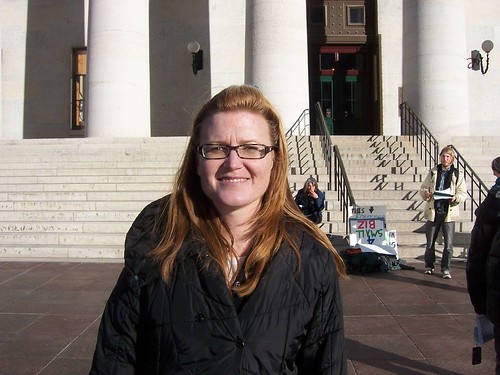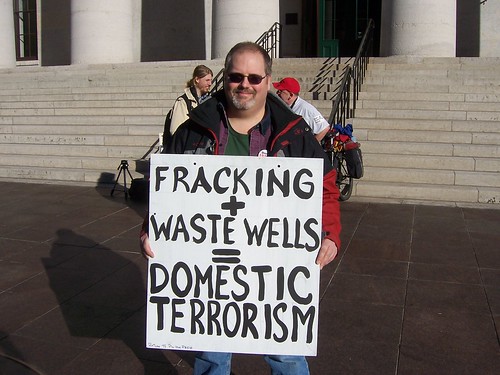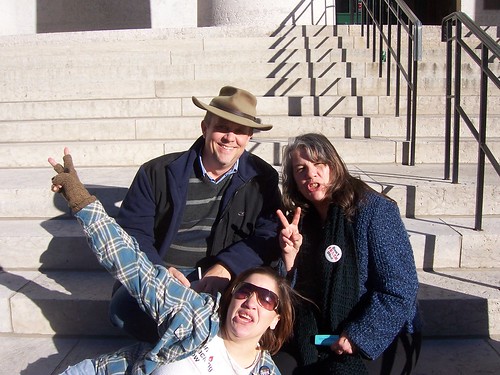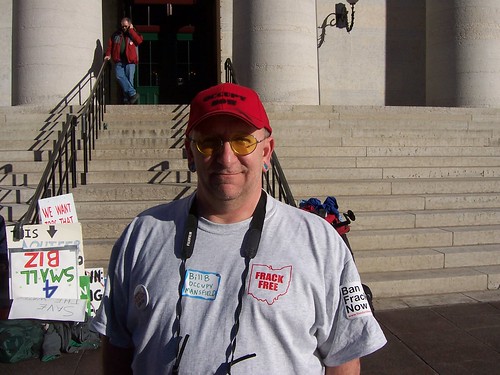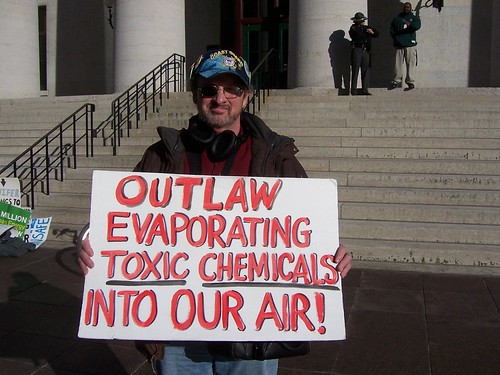WCRS Podcast - tom
John Boehner using false jobs numbers to push for Keystone XL, says activist
1:06 minutes (1 MB)
- Login to post comments
- Download audio file
Cheryl Johncox on fracking --part 1
3:59 minutes (3.65 MB)
Cheryl Johncox said calling for a moratorium on hydraulic fracturing is not being a perfectionist about the environment at the expense of society’s need for sources of energy. She said she and fellow activists with Buckeye Forest Council simply want better regulations.
“I can’t believe they can put a pit with radioactive fluid a hundred feet from my house and not even have to fence it in.”
Johncox said that as of 2010, Ohio no longer requires companies engaged in fracking to keep radioactivity logs. She said fracking fluids from Marcellus shale and Utica shale contain radioactive particles at a thousand times the recommended limit.
- Login to post comments
- Download audio file
Cheryl Johncox on fracking -part 2
- Login to post comments
- Download audio file
Green Party candidate talks about fracking
5:24 minutes (4.94 MB)
Howard Markert from Youngstown Ohio is a Green Party candidate for Mahoning County Commissioner.
Markert said hydraulic fracturing is not new.
“It’s been in use for more than 60 years. What’s new is the combination of the horizontal drilling technique, which has only been around for about 15 years, and the high volume slick water concept. Instead of tens of thousands or 50,000 gallons of water per well, they’re using anywhere from 8 to 10 million gallons of water per well; and anywhere from 7,500 to 50,000 gallons of concentrated chemicals.”
Market said those who say there are no alternatives to fracking for providing the energy to run modern society should look to Germany.
“Currently, Germany, a country four times the size of Ohio, produces more than 40 percent of their energy from renewables. They produce more energy from solar panels---both photovoltaic and thermal---than all of North America combined. Yet they’re farther north than Ohio, and have only 50 percent of the available solar energy that we do.”
Markert said public policy explains the difference between Germany and the United States.
“Germany’s government have been very proactive in making sure that subsidies and incentives are put in place to encourage the development of green energy alternatives and discourage the use of fossil fuels through taxes.”
- Login to post comments
- Download audio file
Connie Harris on fracking
2:50 minutes (2.6 MB)
Connie Harris has been involved with activism in Columbus for many years. Presently working with Occupy Mansfield, she came to the State Capital on Jan 10 to protest for a moratorium on fracking.
“We had a great turnout. If people keep pushing hard enough, maybe they (politicians) will listen. In Mansfield, the Occupy group was able to work with the city government, Republicans and Democrats. They’re building a so-called war chest to build a fund to keep fighting for laws for better oversight (of fracking).”
Harris said the moratorium would allow time for properly assessing the risks and possible benefits of fracking.
“ A lot of these communities, they’re losing all their factory work and other jobs. They’re treating some of these communities like wastelands. People have to live there and work and send their children to school. This is some real dangerous stuff. They (government officials and industry) don’t know enough about it. We don’t know enough about it.
She said her recent involvement with fracking ties into other activism she has done over the years. The common theme is that politicians are not in tune with the will of the people.
“Government agencies are doing what they want to do. They’re definitely more interested in mulah than the safety of our communities. I just happen to be living in a town where they want to build two (fracking) wells. They want to give the underground an enema.”
- Login to post comments
- Download audio file
Bill Baker of Occupy Manfield talks about fracking
4:51 minutes (4.44 MB)
Members of Occupy Mansfield choose Bill Baker as a person to send to Columbus for the protest on Jan. 10, regarding the issue of hydraulic fracturing. Baker said some people might be over-reacting in their environmental concerns about fracking. But he said it’s important to seek out the facts about this issue, instead of relying on information from the gas and oil industries. For solid data he recommends the Department of Environmental Conservation of the state of New York.
www.dec.ny.gov/energy/75370.html
“I can go there for reference and actually learn about both sides of the issue.”
Baker has been involved with Occupy Mansfield since October, helping them to raise money for a women’s and children’s shelter there as well as support for small businesses. He said the issue of fracking suits the Occupy Movement.
“Corporate America’s frenzy to get rich has snowed us over and pushed this industry on us without really guaranteeing us a safe environment and good jobs.”
As for ‘renewable’ energy, Baker agreed there might be better terms to use given that solar technology requires rare earth materials and involves toxic materials in the manufacturing process. But he also agreed using solar technology may involve a net benefit to the natural (as well as the political) environment.
- Login to post comments
- Read more
- Download audio file
Warren Ohio resident on fracking
1:57 minutes (1.78 MB)
“One of my main peeves is that we’re not putting enough resources into developing renewable energy.”
That’s because the lobbying of big business, O’Toole said.
“I would like to see, practically, that there are some limits put on how much power lobbyists can have with our elected representatives. It’s time that they started representing us.”
He supports the Occupy Movement.
“Throughout Ohio and throughout the Rustbelt, Youngstown and Warren, I support them fully.
- Login to post comments
- Download audio file
Activist calls for nonviolent resistance
5:20 minutes (4.88 MB)
I wanted to talk with this person who goes by name of 9 Tails because I was impressed by his efforts to calm down a fellow activist as Columbus Police made arrests in the lobby of US Bank on Nov 15.
During the arrests which protestors say happened without any prior warning from bank security guards or police, 9 Tails repeatedly said in a booming voice "do not resist" as one of the protestors began shouting to police after they grabbed his girlfriend.
I spoke with 9 Tails shortly after he and six others were released from jail several hours after being held on charges of 4th degree misdemeanor trespassing.
"The reason I had said what I had said (to not resist arrest) is that we need to stay peaceful, no matter what the cause is. What I saw in Oakland sickened me. As long as we keep to a more peaceful manner, we maintain the ability to get our message out."
He said resisting arrest can result in police and judges placing more serious charges against activists, making it harder for them to go about their work by increasing the amount of money for bail, and the amount of time in jail and off the streets.
According to Bob Hart, an attorney who had been working with Occupy Columbus, more serious charges could involve restraining orders curbing activists participation in events.
9 Tails said violence only begets more violence.
"People get scared. Now, some might get riled up, but if you can show the same kind of power without raising a hand, that's a far bigger statement and far stronger. Ghandi did it."
- Login to post comments
- Read more
- Download audio file
[audio-tag-artist-raw] - [audio-tag-title-raw]
15:33 minutes (14.23 MB)
- Login to post comments
- Download audio file
Pearl Market Manager Adam Schroeder
15:33 minutes (14.23 MB)
Two weeks ago Columbus officials said the Pearl Market's tents on the sidewalks of Broad Street and High Street were in violation of city code.
As the market scaled down to comply w/ the city, some venders were not able to stay. Here’s what Schroeder had to say about how that decision was made.
“ We looked at a number of different factors when deciding that--things like attendance; customer demand for the product; how that product may have been represented in the market in terms of the number of bakers, the number of bread venders, the number of jewelers. That kind of thing.
“We looked at sales history, how long they’d been participating in the market--following the rules. That kind of thing. We tried to limit the number of venders we needed to remove. In some cases we went to venders and said, ‘you used to be a two-day-a-week vender, but we can now only have you one day a week, either Tuesdays or Fridays, or nothing.’ And they were happy to have the spot that we were able to offer them.”
Schroeder also talked about the social, economic, and environmental importance of Pearl Market and other markets like it around Ohio and the rest of the nation.
- Login to post comments
- Download audio file

